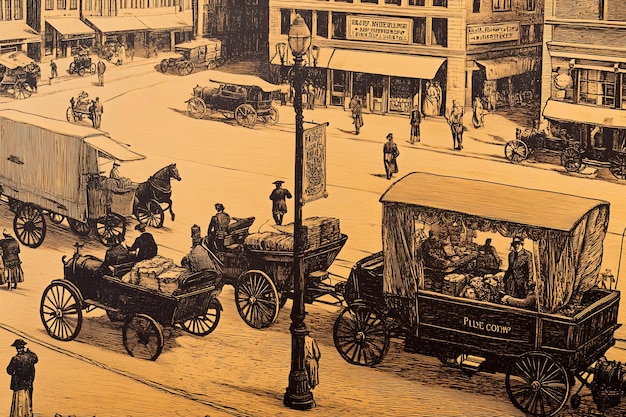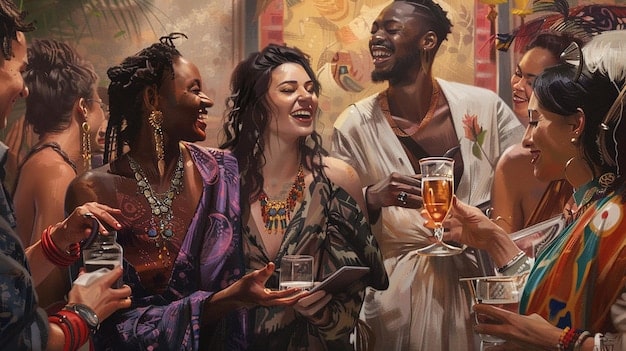The Future of Period Dramas: Which Era Will Captivate Audiences in 2025?

The Future of Period Piece Dramas: Predicting the Next Big Historical Era to Be Adapted in 2025 hinges on audience appetite, unexplored historical narratives, and the creative vision of filmmakers and showrunners, potentially spotlighting forgotten or marginalized stories.
The allure of period piece dramas lies in their ability to transport us to different times, offering a glimpse into the past with captivating storytelling, stunning visuals, and compelling characters. As we look ahead to 2025, the question on every history buff’s and TV enthusiast’s mind is: what will be the Future of Period Piece Dramas: Predicting the Next Big Historical Era to Be Adapted in 2025?
Untapped Historical Goldmines for Period Dramas
The world is rich with untold stories, and history offers a vast playground for creative minds. While certain eras like the Victorian era, the Regency period, and World War II have been extensively explored, many fascinating periods remain relatively untouched by mainstream period piece dramas. These “untapped goldmines” offer fresh narratives, unique cultural contexts, and the potential to resonate with modern audiences seeking diverse and engaging stories.
Pre-Columbian Americas: A Realm of Intrigue
Before European contact, the Americas were home to thriving civilizations with complex societies, intricate political systems, and rich artistic traditions. Exploring the worlds of the Maya, Aztec, Inca, and other pre-Columbian cultures could offer a refreshing alternative to Eurocentric historical narratives.
The Silk Road: Crossroads of Civilizations
The Silk Road was more than just a trade route; it was a conduit for cultural exchange, religious diffusion, and technological innovation. Dramatizing the lives of merchants, monks, soldiers, and adventurers who traversed this ancient network could offer a fascinating tapestry of intercultural encounters and historical intrigue.
- The rise and fall of the Mongol Empire, and its impact on the Silk Road.
- The journeys of famous travelers like Marco Polo and Xuanzang.
- The spread of Buddhism, Islam, and other religions along the Silk Road.
- Intrigue between kingdoms and empires vying for control of the Silk Road.

These are just a few areas of potential. As period dramas evolve, it’s likely that filmmakers will look to new, less well-known periods and events.
The Power of Underrepresented Voices in Historical Narratives
Recent years have witnessed a growing demand for more inclusive and diverse storytelling in period piece dramas. Audiences are increasingly interested in historical narratives that foreground the experiences of marginalized communities, women, people of color, and LGBTQ+ individuals. By amplifying these underrepresented voices, period dramas can offer a more nuanced, complex, and relevant understanding of the past.
Women in Ancient Societies: Beyond the Stereotypes
Far from being passive figures, women in ancient societies often played vital roles in politics, religion, economics, and culture. Exploring the lives of female pharaohs, Celtic queens, or female philosophers could challenge traditional gender roles and provide empowering narratives for modern audiences.
LGBTQ+ Histories: Unveiling Hidden Stories
LGBTQ+ individuals have always existed throughout history, yet their stories have often been marginalized or erased. Period dramas can shed light on these hidden histories, exploring same-sex relationships, gender nonconformity, and LGBTQ+ activism in different cultural contexts.
- Dramatizing the lives of historical figures like Sappho or Chevalier d’Eon.
- Exploring the prevalence of same-sex relationships in ancient Greece and Rome.
- Depicting the struggles and triumphs of LGBTQ+ communities throughout history.
- Examining the social and legal climates surrounding LGBTQ+ identities in different eras.
By focusing on historically marginalized voices, television and film can broaden our understanding of history in a way that informs audiences today.

Technological Advancements and Their Impact on Period Dramas
Advancements in filmmaking technology continue to transform the landscape of period piece dramas. From CGI and visual effects to immersive sound design and virtual production, these technological innovations allow filmmakers to recreate historical settings with unprecedented accuracy and detail, enhancing the viewing experience and blurring the lines between reality and fiction.
Virtual Production: Bringing History to Life
Virtual production techniques, which combine live-action footage with real-time CGI environments, offer filmmakers greater control over the visual aspects of period dramas. By creating historically accurate virtual sets and landscapes, filmmakers can transport actors and audiences to the past with remarkable realism.
CGI and Visual Effects: Recreating Lost Worlds
CGI and visual effects have become indispensable tools for recreating historical events, battles, and architectural wonders. From the sweeping landscapes of ancient Rome to the intricate details of Victorian London, CGI enables filmmakers to bring lost worlds to life in a visually stunning manner.
- Recreating historical battles with epic scale and realism.
- Bringing extinct animals and prehistoric landscapes to the screen.
- Restoring damaged or destroyed historical monuments and buildings.
- Animating historical documents, maps, and artifacts.
The integration of new technology can allow filmmakers to tell stories in creative new ways.
The Influence of Social and Political Movements on Period Dramas
Period piece dramas often reflect the social and political concerns of their time. As contemporary societies grapple with issues such as inequality, injustice, and climate change, period dramas can serve as powerful platforms for exploring these issues through historical lenses, prompting reflection, dialogue, and social change.
The Fight for Social Justice: Lessons from the Past
Period dramas can shed light on historical struggles for civil rights, women’s rights, and LGBTQ+ equality, drawing parallels between past and present and inspiring viewers to advocate for social justice in their own communities.
Environmentalism: Echoes of Ecological Awareness
Period dramas can highlight historical instances of ecological awareness, environmental activism, and sustainable practices, reminding audiences of the importance of protecting the planet for future generations. Examining moments of environmental action in the past inspires contemporary action in the present.
Historical shows can make a big difference by helping to address and analyze contemporary social issues.
The Resurgence of Interest in Specific Historical Eras
Predicting the next big historical era to be adapted in 2025 requires understanding current audience preferences, cultural trends, and historical anniversaries. Certain periods may experience a resurgence in popularity due to renewed scholarly interest, upcoming commemorative events, or simply a desire for escapism and nostalgia.
The Roaring Twenties: A Decade of Glamour and Rebellion
With the centennial of the Roaring Twenties having just passed, there may be a continued interest in this era of jazz, flappers, and economic prosperity followed by devastating crash. Exploring the social, cultural, and political upheavals of this decade could resonate with contemporary audiences seeking escapism and social commentary.
The Cold War: Espionage, Intrigue, and Ideological Conflict
As geopolitical tensions continue to rise, there may be a renewed interest in the Cold War era, with its spy games, ideological battles, and nuclear anxieties. Dramatizing the lives of spies, politicians, and ordinary citizens caught in the crossfire could provide a chilling reminder of the dangers of ideological extremism.
- The Cuban Missile Crisis and the brink of nuclear war.
- The Berlin Wall and the division of Europe.
- The space race and the competition for technological supremacy.
- The rise of counterculture and social unrest.
As anniversaries approach for certain key historical events, interest increases from audiences.
The Enduring Appeal of Royalty and Aristocracy in Period Dramas
Despite changing social norms and evolving audience tastes, period dramas centered on royalty and aristocracy continue to captivate viewers worldwide. The allure of palaces, titles, and courtly intrigue remains strong, offering a glimpse into a world of privilege, power, and dramatic personal struggles.
Royal Scandals: Love, Betrayal, and Power Struggles
Period dramas often explore the scandalous lives of kings, queens, and courtiers, revealing the hidden dramas behind the stately facades of royal palaces. Love affairs, betrayals, and power struggles provide ample material for compelling storylines and complex character development.
The Decline of Empires: A Glimpse into Historical Turning Points
Period dramas can also explore the decline and fall of empires, offering a glimpse into the social, economic, and political factors that contributed to their demise. These narratives can serve as cautionary tales about the dangers of hubris, decadence, and unchecked power.
Studying the failures and successes of leaders from the past can inform the future.
Conclusion
Predicting the next big historical era to be adapted in 2025 is a complex task, but by considering audience preferences, technological advancements, social and political trends, and the enduring appeal of certain historical narratives, we can gain insights into the future of period piece dramas. Ultimately, the success of any period drama depends on its ability to tell compelling stories, create relatable characters, and offer a fresh perspective on the past, ensuring that these dramas continue to captivate and entertain audiences for years to come.
| Key Point | Brief Description |
|---|---|
| 🌍 Untapped Eras | Exploring less known historical periods. |
| 🎤 Diverse Voices | Spotlighting marginalized communities and stories. |
| 🎬 Tech Impact | Advances in filmmaking enhance historical accuracy. |
| 👑 Royalty’s Charm | The ongoing appeal of royal dramas. |
FAQ
A successful period drama combines compelling storytelling, historical accuracy, relatable characters, and striking visuals. It should transport audiences and offer them new insights into the past.
Including underrepresented voices provides a more complete and accurate historical narrative. It offers fresh perspectives and challenges traditional, often biased, historical accounts.
Technological innovations, such as virtual production and CGI, allow filmmakers to recreate historical settings and events with greater accuracy and realism, enhancing audience immersion.
Eras that offer unique cultural contexts, untold stories, and relevant social or political themes are ripe for adaptation. These include pre-Columbian Americas and the Silk Road.
Royal dramas offer a glimpse into a world of power, privilege, and intrigue. The personal struggles and scandalous lives of royalty continue to fascinate audiences worldwide.
Conclusion
As we anticipate the future of period piece dramas, with a keen eye on the potential narratives of 2025, it is clear that the intersection of historical authenticity, diverse storytelling, and technological innovation will shape the landscape. The key to success lies in crafting narratives that not only transport audiences to different eras but also resonate with contemporary values, ensuring these dramas remain captivating and relevant.





